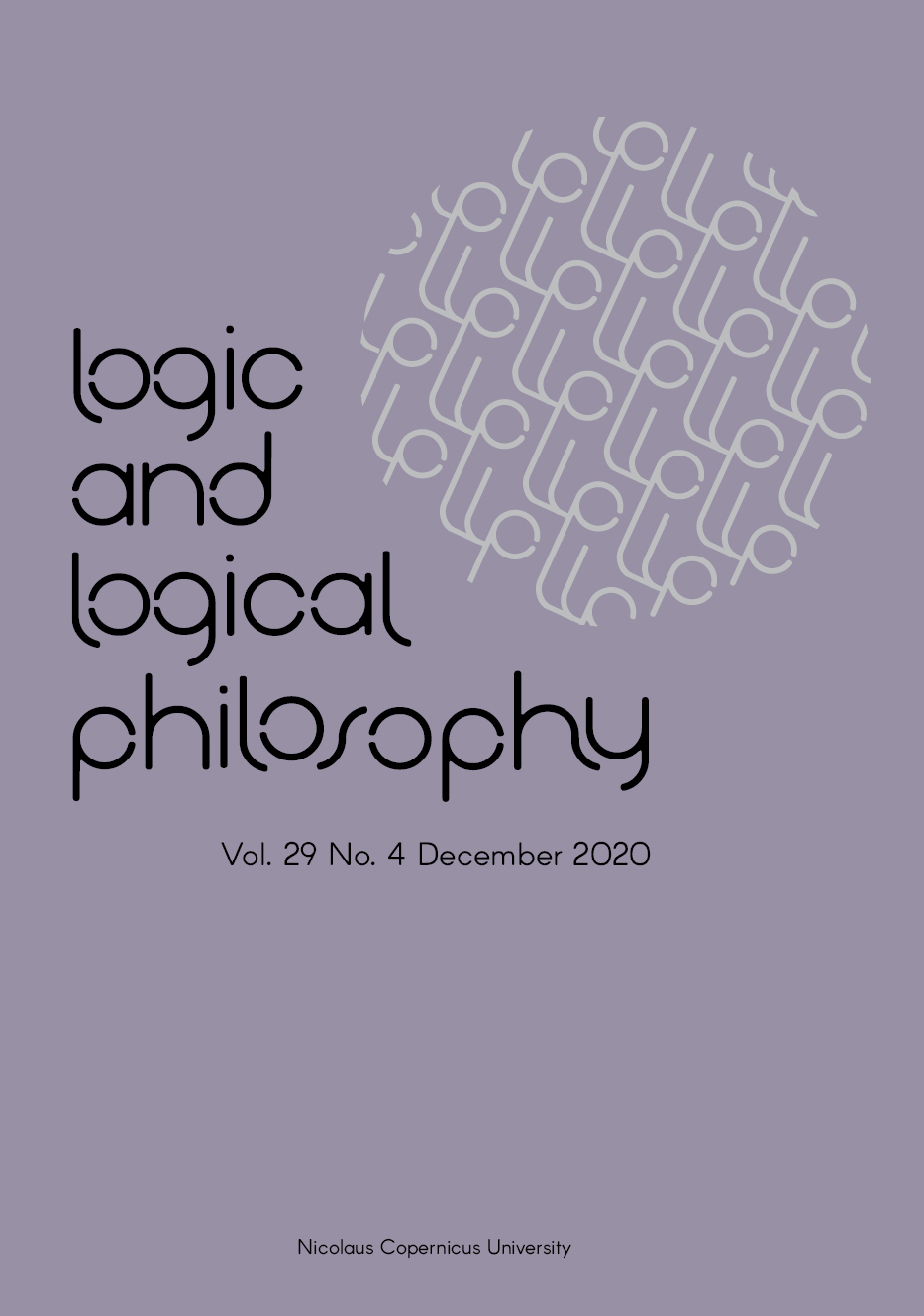A Classical Logic of Existence and Essence
DOI:
https://doi.org/10.12775/LLP.2020.009Keywords
essence, existence, qualitative identity, essential identity, abstract objects, possible worlds semantics, quantified modal logicAbstract
The purpose of this paper is to provide a new system of logic for existence and essence, in which the traditional distinctions between essential and accidental properties, abstract and concrete objects, and actually existent and possibly existent objects are described and related in a suitable way. In order to accomplish this task, a primitive relation of essential identity between different objects is introduced and connected to a first order existence property and a first order abstractness property. The basic idea is that possibly existent objects are completely determinate and that essentially identical objects are just different individuations of the same individual essence. Accordingly, essential properties are defined as properties that are invariant with respect to this kind of identity, while abstract objects are determined by being characterized by essential properties only. Once such ideas are implemented, a number of classical intuitions about objects, their essence, and their way of existence can be consistently interpreted.
References
Adams, R.M., 1981, “Actualism and thisness”, Synthese 49: 3–41.
Berto, F., 2012, Existence as a Real Property, Dordrecht: Springer.
Chalmers, D., D. Manley, and R. Wasserman, 2009, Metametaphysics, Oxford: Clarendon Press.
Fara, D.G., 2008, “Relative-sameness counterpart theory”, The Review of Symbolic Logic 1: 167–189. DOI: http://dx.doi.org/10.1017/S1755020308080155
Fine, K., 1994, “Essence and modality”, Philosophical Perspectives 8: 1–16.
Fine, K., 1995, “Ontological dependence”, Proceedings of the Aristotelian Society 95: 269–290.
Fitting, M., and R. Mendelsohn, 1998, First-Order Modal Logic, Dordrecht: Spinger.
Gracia, J., 1994, Individuation in Scholasticism, Albany, NY: State University of New York Press.
Hughes, G., and M. Cresswell, 1996, A New Introduction to Modal Logic, London: Routledge.
Jager, T., 1982, “An actualist semantics for quantified modal logic”, Notre Dame Journal of Formal Logic 23: 335–349.
Kripke, S., 1980, Naming and Necessity, Cambridge: Harvard University Press.
Lewis, D., 1986, On The Plurality of Worlds, Oxford: Blackwell.
Linsky, B., and E. Zalta, 1991, “Is Lewis a Meinongian?”, Australasian Journal of Philosophy 69: 438–453.
Linsky, B., and E. Zalta, 1994, “In defense of the simplest quantified modal logic”, Philosophical Perspectives 8: 431–458.
Linsky, B., and E. Zalta, 1996, “In defense of the contingently non-concrete”, Philosophical Studies 84: 283–294.
Linsky, B., and E. Zalta, 2006, “Essence and modallity”, Mind 115: 659–693.
Loux, M., 1979, The Possible and the Actual, Ithaca: Cornell.
Lowe, E.J., 1998, The Possibility of Metaphysics, Oxford: Clarendon Press.
Lowe, E.J., 2006, The Four-Category Ontology, Oxford: Clarendon Press.
McDaniel, K., 2009, “Ways of being”, pages 290–319 in (Chalmers et al., 2009).
Menzel, C., 1990, “Actualism, ontological commitment, and possible worlds semantics”, Synthese 58: 355–389.
Menzel, C., 1991, “The true modal logic”, Journal of Philosophical Logic 20: 331–374. DOI: http://dx.doi.org/10.1007/BF00249434
Nachtomy, O., 2007, Possibility, Agency, and Individuality in Leibniz’s Metaphysics, Dordrecht: Springer.
Plantinga, A., 1974, The Nature of Necessity, Oxford: Oxford University Press.
Plantinga, A., 1976, “Actualism and possible worlds”, Theoria 42: 139–160.
Plantinga, A., 1983, “On existentialism”, Philosophical Studies 44: 1–20.
Shaffer, J., 2009, “On what grounds what”, pages 347–383 in (Chalmers et al., 2009).
Stalnaker, R., 2003, Ways a World Might Be, Oxford University Press: Oxford.
van Inwagen, P., 2009, “Being, existence, and ontological commitment”, pages 472–506 in (Chalmers et al., 2009).
Williamson, T., 1998, “Bare possibilia”, Erkenntnis 48: 257–273.
Zalta, E., 1988, Intensional Logic and the Metaphysics of Intentionality, Cambridge: MIT Press.
Downloads
Published
How to Cite
Issue
Section
Stats
Number of views and downloads: 686
Number of citations: 1







